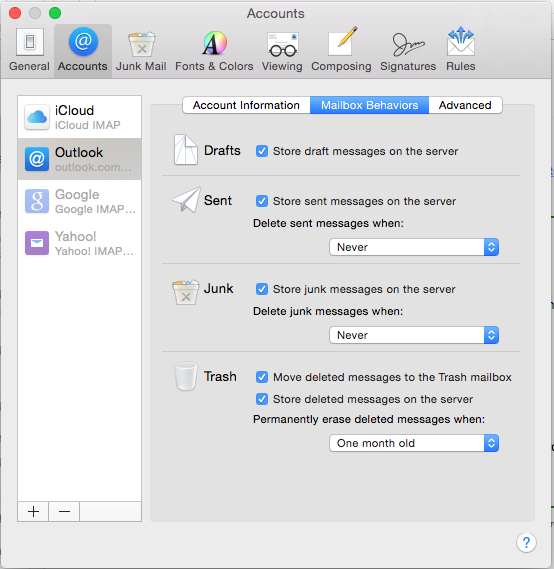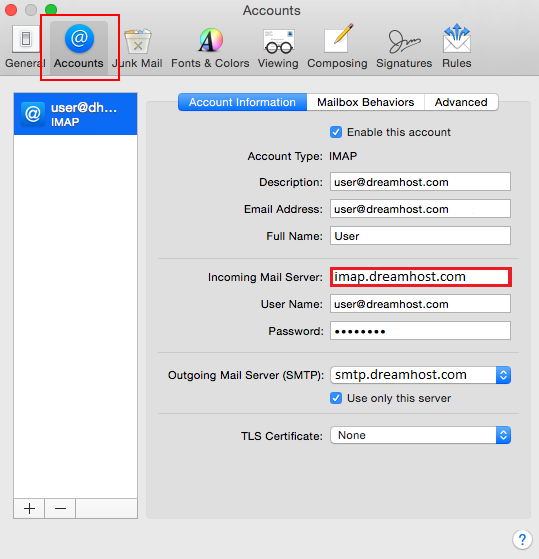Mail User Guide
- Email Settings For Microsoft
- Macbook Pro Email Settings
- Email Settings For Mac
- Yahoo Email Setting For Mac Mail
- Macbook Air Email Settings
Set up your email account in Mac Mail. To configure your SiteGround email account to work on the Mail app on your Mac, open the Mail app and from the pop-up, choose Other Mail Account Continue. Enter your name, email address (user@yourdomain.com), the password for the email account, and click Sign In. On the next screen, fill in the server settings. Learn how to set up email client programs for Comcast email. Learn how to set up email client programs for Comcast email. How to Set Up Your Comcast Email Address with an Email Program. Learn how to set up email client programs for Comcast email. A security upgrade is coming to AT&T email, so if you have certain email programs or apps, you’ll have to update your settings. Learn more about the security upgrade. If your program or app is affected, be sure to create a secure mail key.You’ll need it to set up or keep getting your AT&T email with a desktop program or mobile app. Mail is a very popular, free to use email service providers. This guide will help you setup the macOS Mail program to access your email, rather than rely on the web interface. Before You Begin.
Use the Mail app to send, receive, and manage email for all of your email accounts in one location. Simply add the accounts—such as iCloud, Exchange, Google, school, work, or other—you want to use in Mail.
Add an email account
The first time you open the Mail app on your Mac, it may prompt you to add an account. Select an account type—if you don’t see your type, select Other Mail Account—then enter your account information.
If you already added an email account, you can still add more. In Mail, choose Mail > Add Account, select an account type, then enter your account information. Make sure the Mail checkbox is selected for the account.
If you’re using an account on your Mac with other apps, such as Contacts or Messages, you can also use that account with Mail. In Mail, choose Mail > Accounts to open Internet Accounts preferences, select the account on the left, then select the Mail checkbox on the right.
Temporarily stop using an email account
In the Mail app on your Mac, choose Mail > Accounts.
Select the account, then deselect the Mail checkbox.
Now the account’s messages are not shown in Mail.
To use the account again with Mail, select the Mail checkbox; the account’s messages are shown again (they don’t need to be downloaded from the server again).
Remove an email account

Email Settings For Microsoft
When you remove an email account from Mail, the account’s messages are deleted and no longer available on your Mac. Copies of messages remain on the account’s mail server and are still available (from webmail, for example).
Important: If you’re unsure whether messages you want to keep are still on the mail server, move or copy them to a mailbox stored on your Mac (the mailbox appears in the On My Mac section in the Mail sidebar) before you delete the account in Mail.
In the Mail app on your Mac, choose Mail > Preferences, then click Accounts.
Select an account, then click the Remove button .
Note: If the account is used by other apps on your Mac, you’re asked to remove the account in Internet Accounts System Preferences. Click the button to open Internet Accounts, then deselect the Mail checkbox for the account. To stop using the account in all apps, make sure the account is selected, then click the Remove button .
Mail User Guide
Use Server Settings preferences in Mail to change options for an account’s incoming and outgoing (SMTP) mail servers.
To change these preferences in the Mail app on your Mac, choose Mail > Preferences, click Accounts, then click Server Settings.
Note: The settings you see vary depending on your account type.
Macbook Pro Email Settings
Incoming mail server settings
Option | Description |
|---|---|
User Name | Your user name on the mail server. |
Password | Your password on the mail server. |
Host Name | The name of the mail server. |
Automatically manage connection settings | Mail automatically manages settings for your email account in Mail, such as port numbers and authentication methods. If you deselect this option, you can specify the following, as directed by your email account provider:
|
Advanced IMAP or Exchange Settings | Enter or change these settings as directed by your email account provider:
|
Email Settings For Mac

Yahoo Email Setting For Mac Mail
Outgoing mail server (SMTP) settings
Macbook Air Email Settings
Option | Description |
|---|---|
Account | The account of the mail server. To change outgoing server settings, as directed by your email account provider, click the Account pop-up menu, then choose Edit SMTP Server List. |
User Name | Your user name on the mail server. |
Password | Your password on the mail server. |
Host Name | The name of the mail server. |
Automatically manage connection settings | Mail automatically manages settings for your email account in Mail, such as port numbers and authentication methods. If you deselect this option, you can specify the following, as directed by your email account provider:
|
